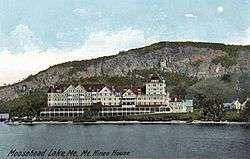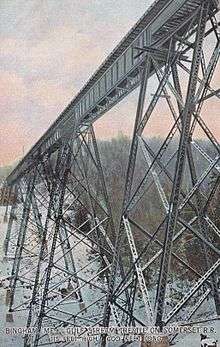Somerset Railroad (Maine)
 The Mt. Kineo House in 1908 | |
| Locale | Maine |
|---|---|
| Dates of operation | 1873– |
| Track gauge | standard gauge |
| Length | 91 miles (146 km) |
The Somerset Railroad was built to serve Kennebec River communities and later extended through timberlands to a large wooden Victorian era destination hotel on Moosehead Lake. The railway became part of the Maine Central Railroad in 1911; and a portion remains in intermittent operation by Pan Am Railways.
History
Somerset Railroad was chartered in 1860 to build north along the Kennebec River from the Maine Central Railroad "back road" at Oakland, Maine. The line originally shared the Maine Central Portland gauge of 5 ft 6 in (1,676 mm). Construction reached Norridgewock in 1873, Madison in 1875, and North Anson in 1877. The company defaulted in 1879 and was reorganized as the standard gauge Somerset Railway in 1884 before construction continued to Solon in 1889 and Bingham in 1890. The reorganized company extended the line to Moosehead Lake in 1906 and built a large resort hotel called the Mount Kineo House. The railroad had fifteen plush upholstered coaches, nine baggage cars, and twelve combination smoking-baggage cars with leather seats in the smoking section.[1] Hotel patrons arrived on through Pullman cars from large eastern cities, and reached the hotel by steamboat from the railroad terminal at Kineo Station. Maine Central railroad purchased the Mount Kineo House with the Somerset Railway; and the railway became the Kineo branch of the Maine Central Railroad in 1911. Aboriginal forests had been converted to lumber and pulpwood before the last passenger train over the branch ran in September, 1933; and the line north of Bingham was dismantled that year.[2] The Mount Kineo House was razed in 1938.[3]
Mount Kineo was not the only destination sought by passengers on the Old Somerset Railroad. Many prominent figures of the time, such as Theodore Roosevelt and Henry David Thoreau, ventured to Maine's Somerset County in search of wilderness. Lake Moxie Station became the jumping off point for sporting camps and remote destinations north along the current U.S. Route 201 all the way up to The Forks, Lake Parlin, and Upper Enchanted Township.
Bingham became an important loading point for pulpwood floated down the Kennebec River to Wyman Dam until environmental regulations curtailed log driving in the 1970s. A paper mill at Madison was the last major customer on the branch originating or terminating 3,000 annual carloads in 1973.[4]
Railway mileposts

- Milepost 0: Oakland on the Maine Central Back Road; location of railroad shops
- Milepost 13: Norridgewock
- Milepost 20.9: Madison paper mill
- Milepost 21.3: Anson
- Milepost 25.3: North Anson
- Milepost 30.4: Embden
- Milepost 33.9: Solon pulp mill, potato house, and corn cannery
- Milepost 41: Bingham
- Milepost 48.2: Deadwater sawmill
- Milepost 52.2: Bald Mountain logging branch
- Milepost 60.1: Mosquito
- Milepost 64.7: Lake Moxie sawmill
- Milepost 85.3: Somerset Junction (with the Canadian Pacific Railway International of Maine Division)
- Milepost 91.5: Kineo Station[5]
Early locomotives
| Number | Name | Builder | Type | Date | Works number | Notes |
|---|---|---|---|---|---|---|
| General Veazie | Kerk | former European and North American Railway locomotive leased from Maine Central Railroad during initial railway construction[6] | ||||
| Somerset | Hinkley Locomotive Works | 4-4-0 | purchased used after service on the Portland, Saco & Portsmouth and Eastern railroads; replaced by Caratunk[6] | |||
| 1 | Caratunk | Hinkley Locomotive Works | 4-4-0 | used locomotive purchased to replace Somerset[6] | ||
| 2 | Black Dinah | used as a yard shunter after delivery of Old Point[6] | ||||
| 2 | Old Point | Portland Company | 4-4-0 | 1869 | 150 | purchased 1875[6] |
| 2 | Manchester Locomotive Works | 4-4-0 | 1901 | 1760 | last locomotive to bear this number; became Maine Central Railroad # 84[7] | |
| 3 | Norridgewock[6] | 4-4-0 | ||||
| 4 | Carrabassett[6] | 4-4-0 | ||||
| 5 | Moxie[6] | 4-4-0 | ||||
| 6 | Bombazeen[6] | 4-4-0 | ||||
| 7 | Messalonskee[6] | Manchester Locomotive Works | 4-4-0 | 1900 | 1743 | purchased new; became Maine Central Railroad # 85[7] |
| 10 | American Locomotive Company (Manchester) | 4-4-0 | 1907 | 41438 | purchased new for passenger service; became Maine Central Railroad # 86[7] | |
| 12 | American Locomotive Company (Manchester) | 4-4-0 | 1907 | 41439 | purchased new for passenger service; became Maine Central Railroad # 87[7] | |
| 20 | Baldwin Locomotive Works | 4-6-0 | 1905 | 26269 | purchased new for freight service; became Maine Central Railroad # 106[7] | |
| 21 | Baldwin Locomotive Works | 4-6-0 | 1905 | 26270 | purchased new for freight service; became Maine Central Railroad # 107[7] | |
| 22 | American Locomotive Company (Manchester) | 4-6-0 | 1906 | 41437 | purchased new for freight service; became Maine Central Railroad # 108[7] | |
| 23 | American Locomotive Company (Manchester) | 4-6-0 | 1906 | 41437 | purchased new for freight service; became Maine Central Railroad # 109[7] |
References
- ↑ Macdougall, Walter Marshall The Old Somerset Railroad (2000) Downeast Books ISBN 0-89272-492-7 p.179
- ↑ Johnson, Ron (1985). The Best of Maine Railroads. Portland Litho. pp. 48, 53, 74–75&111.
- ↑ Peters, Bradley L. (1976). Maine Central Railroad Company. Maine Central Railroad. p. 11.
- ↑ United States Department of Transportation (1974). Rail Service in the Midwest and Northeast Region. United States Government Printing Office.
- ↑ Maine Central Railroad (1917). Hand-Book of Officers, Agents, Stations and Sidings. Edwin B. Robertson.
- 1 2 3 4 5 6 7 8 9 10 Macdougall, Walter Marshall The Old Somerset Railroad (2000) Downeast Books ISBN 0-89272-492-7 pp.169-174
- 1 2 3 4 5 6 7 8 Robertson, Edwin B. Maine Central Steam Locomotives (1977) Robertson pp.7&9